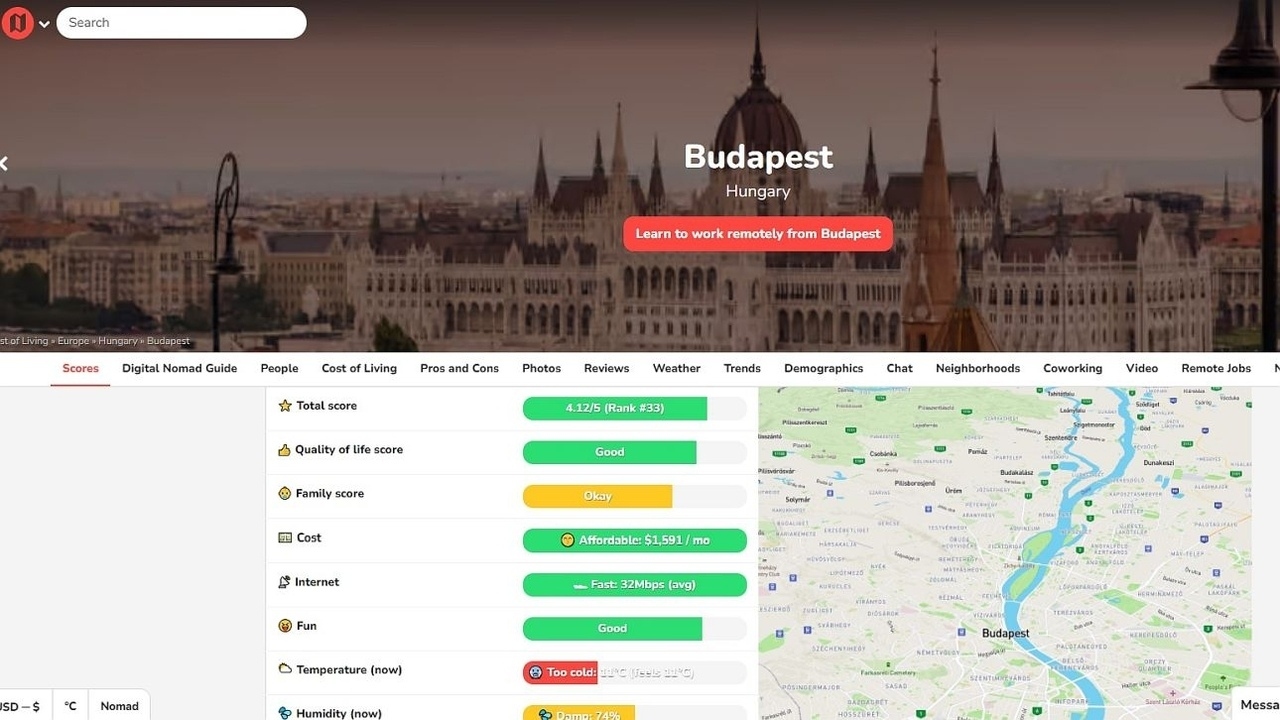Change language:
Budapest is becoming a popular place among digital nomads

This year, Hungary joined the list of countries that explicitly support the entry and temporary settlement of digital nomads.
Digital nomads
The digital nomad lifestyle, which is becoming increasingly popular in the world, is all about allowing people who work exclusively online or run their business remotely to move freely from one continent to another. In their chosen country, they apply for a White Card which helps them to travel from third countries and adapt to their lifestyle of choice.
As Dávid Rasztovits, CEO of Digital Tourism Kft. (Digitális Turizmus Kft.), told turizmus.com,
Budapest got into an “interesting, complex matrix”.
This “complex matrix” is quite diverse: for digital nomads, internet speed is essential, and in Budapest, it is excellent and cheap. What is more, it is also free in hotels and restaurants, while abroad, you often have to pay for Wi-Fi in such places. On top of this, Hungary is in the top ten countries when it comes to infocommunications.
Hungary and digital nomads

Rasztovits added that
Hungary’s capital is extremely popular with digital nomads, as evidenced by nomadlist.com, a statistics site that provides them with basic information.
In July 2021, a government resolution was adopted on Hungary’s support for the entry and temporary settlement of digital nomads, and in November, the Parliament voted in favour of it, as schengenvisainfo.com reported.
As mentioned above, digital nomads have to apply for a so-called White Card in the country of their choice. However, not everyone can apply for one: for instance, a person who has already applied for a residence permit in Hungary for other purposes, such as studying, cannot apply for a White Card. Citizens of EEA member states (EU member states, Norway, Iceland, Liechtenstein) cannot apply for a White Card, as they are subject to different entry-stay rules.
In Hungary, the White Card is available from 1 January 2022, as Budapest does not want to miss out on this trend,
which can help the further development of start-ups in the Hungarian tech sector and also reduce the labour shortage in the sector.
The number of digital nomads in the world has seen a significant increase recently, and one of the main reasons for this is the pandemic.
“It’s a very trendy lifestyle among young people, and it’s no coincidence that in many countries, there is already a marketing campaign around it, which is driving up demand,”
says Rasztovits.
As turizmus.com puts it, digital nomads have a high income and spend a lot of money, so it is a great opportunity for Budapest and its surroundings to increase consumption. Here, value for money, livability, and security are right for them, and of course, a coffee that costs two euros here costs five euros elsewhere.
Rasztovits believes that digital nomadism could be a separate brand for Hungary, estimating that there are currently around 3-5 thousand digital nomads working in Budapest. In the summer season, this number could jump to 8-10 thousand, but this includes European arrivals.
Source: turizmus.com, schengenvisainfo.com








You’re very right about Budapest being an interesting digital nomad location.
In addition to the forementioned good sides, you should not underestimate that the “no-nonsense”, reasonable, right wing political climate is very appealing for young digital nomads living in the ever more politically insane and totalitarian West. It is an alternative, sane society which many, many silent people appreciate.
One last thing I would like to add is that Hungary should begin removing unnecessary bureaucracy and moving into simpler digital systems. When you’re a wealthy digital nomad, the last thing in the world you want to deal with is setting up a company in a bureaucratic system in foreign language. In this age, it should be ideally as simple as clicking a few buttons on a website.
This is a recycled version of sponsored content published by the DNH just last month (18th of January) under the headline ‘What makes Budapest good for digital nomads’. While I am all for recycling most things, news content is an exception. In fact, even the sponsored article is itself a recycled piece, plagiarised from budnews.hu 18th of August 2020 with the headline ‘Budapest is one of the best European cities for digital nomads’. The DNH should realise that some readers have very good memories.